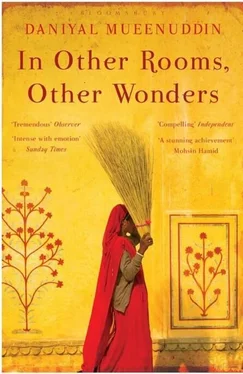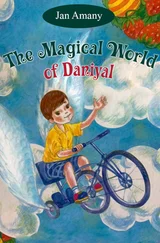Once again neither hail nor winds had ruined the crop, and the fruits of Jaglani’s management stood there beside him, growing, golden. This harvest mattered more to him than any other, more than the mangoes or the cane or the cotton. The men would be paid a portion of their wages throughout the year in wheat, which they preferred, saying that money might be spent, but as long as they had the monthly allowance of wheat their families would not starve. At noon each day Zainab sent out a tray of food to him, covered with a white cloth, and Jaglani ate under the breezy leaves of the banyan, while the men continued to work.
Late one evening, when he returned tired to his house in the dera, having spent the afternoon out along the river, dealing with a tractor that had foundered in a sandbank while returning to the farm with a load of grain, she brought him a glass of sherbet, as she now always did as soon as he walked in the door.
‘Would you like me to press your feet?’ she asked.
This too became part of the routine. He would lie on a charpoy in the shadowed courtyard of his house, smoking a hookah, leaning on one elbow, while she massaged his legs and feet, patiently, her hands red with henna. Her head scarf would slip down to her shoulders, and he admired her thick black hair, braided and oiled. She had strong hands.
Inevitably, one evening he reached for her and took her inside. Now often they would make love before she went home, if he was not too tired. She did this uncomplainingly, giving him whatever he wanted. He had little experience with women, other than the wife to whom he had been married by arrangement at the age of seventeen. Once or twice he had slept with the wives of peasants in the village, when the women threw themselves at him. He would give the husband a job, something that might as well go to one man as to another, but these women were unclean and crude, and once he entered his forties he stopped succumbing to them. He had two sons by his wife, and he continued to sleep with her when he needed release, though he didn’t find her attractive, her slow mind and preoccupation with the household in Firoza, which smelled of cooking. Zainab by contrast knew how to please him. She wore no scent, but bathed always before he came home and wore attractive clothes.
When the harvest ended he still found some pretext to come every day or two to the farm. He would do his business and then go to the house, where Zainab would serve him the meal she had cooked earlier. He would bathe, she would massage him and feed him, and then they would make love. He said her name in a particular way, pronouncing the first syllable in his throat, and this became the emblem of their closeness, which otherwise they did not refer to. In the bedroom, with the lights off, she kissed him hard and soft and gradually persuaded him by her supple actions to lose his inhibitions. She had a way of falling on the bed, with her face buried in the pillow, on her knees. As he drove around the farm, or in the city, the vision of her giving herself so trustingly would come to him.
One evening at bedtime they quarreled. Next morning when she brought his tea, Jaglani reached around her waist and pulled her down beside him, wanting to be reconciled. ‘You never ask for anything. Let me give you some money. You can buy clothes.’
‘You buy me things and then later you’ll think you bought me. I was never for sale,’ she replied, standing up.
‘Stop,’ he called. He spoke in the voice he might have used with a servant.
She left, quietly closing the door behind her.
That evening they said nothing about this, but he left money on the table beside the bed. She did not take it that night, nor the next morning. He went to the city for a few days, and on the evening when he returned to the farm he found the money still where he had left it.
Each time he met her she approached him with the same reserve she had displayed the first time he saw her. She spoke to him formally, called him ‘Chaudrey Sahib.’ When he tried to kiss her, coming in at dusk, her lips would never be hungry. After they made love he would stroke her, run his hands over her slender body, tell her how much she meant to him. He never before had said these things to any woman. She did not caress him, and he felt that she herself was not touched in her core. After they made love she would lie on her back, while he nuzzled her neck and threw one arm across her body. Although she massaged him, cooked for him, cleaned his house, and made love to him, he found that after two months she still had not come any closer. She needed him, he knew that, but he had no idea whether she cared for him. Except when they made love, when she abandoned herself, a red patch of flushed skin brightening each cheek, he found no response in her eyes, except a willingness to serve him. He looked for contempt in her eyes, but did not find even that. He wanted more from her, for her to spend the entire night with him.
‘Why do you care?’ he asked. ‘Are you afraid the other villagers will find out?’
She laughed humorlessly. ‘The villagers! They knew the first night. They leave me alone because they’re afraid of you. It’s nice, it’s a proof of just how much they do fear you. If you dropped me they would call me a whore out loud as I walked down the street.’
‘Then why not spend the nights?’
‘Then I would be your whore. At least now we still pretend. Leave it alone, I’ve already said more than I wanted. Please.’
In July the monsoon began, a strong monsoon, with rain and enormous clouds towering over the flat desert that fell right to the edge of the river. It had rained all day and all night, and Jaglani came to the farm in order to oversee the pumping of water from the cotton fields. Where the fields lay low the young cotton stood under four inches of water. Mechanics removed the turbines from the tube wells and powered them in the fields by shafts run from tractors. If the sun shone on the plants while they stood in the water, the reflected heat would kill them.
That night, late, the watchman from the dera knocked on Jaglani’s door. He rose quickly and took his revolver. ‘Sir, may we use the jeep? Loharu’s son just got bitten by a snake.’ Putting on his clothes, Jaglani sent for Mustafa and went to Loharu’s house.
Lowering his head to walk under the lintel of the small door, stepping carefully in the slippery mud, he approached the family, an old woman and her husband Loharu, who had worked on the farm as a laborer since he became old enough to be useful. They were standing in the little single room by the light of a lantern, the woman quietly sobbing and dabbing at her eyes with her head scarf. A crowd of villagers stood around, some inside and some outside the hut. When Jaglani entered they murmured, ‘Chaudrey Sahib.’ Even in his grief the father fell into a posture of deference, taking Jaglani’s hand and reaching to touch his knee.
The boy lay on a charpoy in one corner, very thin, just developing a mustache. Although still alive, his body had softened and lost all tension. A bit of white foam sat in each corner of his lips. Jaglani knew he would be dead soon, as did the villagers, who had seen this before. Only the parents refused to accept that their son would soon be gone. They heard the jeep coming along the muddy street of the village, splashing, whining in first gear. No one made a move to lift the boy, and after a few more minutes he died, curling now, his throat rattling, and then becoming limp.
The mother fell onto the body, quietly saying, ‘No, no, no, no, no.’
Jaglani went outside. ‘What happened?’ he asked.
‘A cobra came through the window, the water must have filled its hole. The boy’s hand hung over the edge of the charpoy, and the snake brushed the hand.’
Читать дальше












